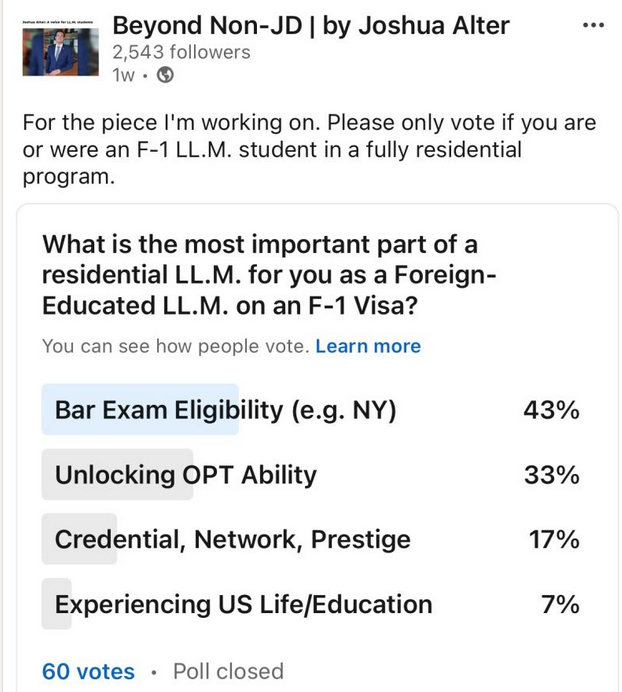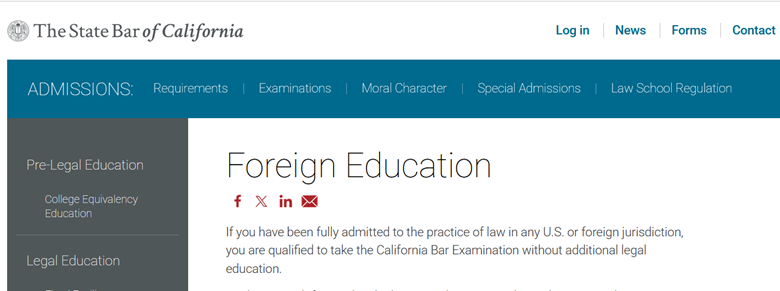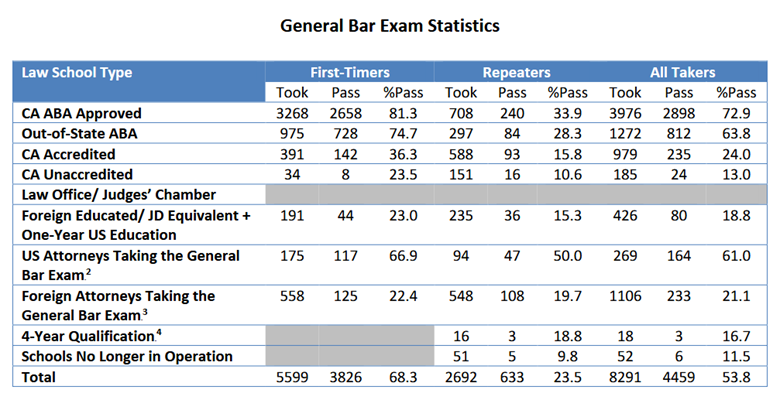“Is California the hardest U.S. bar exam?”
“Do you really not even need an LL.M. to become a California attorney?”
“How do I prepare for a bar exam from abroad while working?”
Foreign attorneys and bar exams in the United States
Attorneys abroad often have questions about bar exams when considering U.S. legal education.
While foreign attorneys educated in common law jurisdictions have more options, those trained in civil law jurisdictions are much more likely to need a residential LL.M. degree for the bar exams they are considering.
Indeed, my latest poll of F-1 LL.M. students highlighted just how important bar exam eligibility in a state like New York is or was to many of those who came to the U.S. to study in LL.M. degrees on F-1 visas.

Enter California
California offers an attractive proposition for foreign attorneys: the ability to bypass U.S. legal education to take their bar exam. But there are many foreign attorneys who study in U.S. LL.M. programs.
Maybe they want the ability to complete a specialized LL.M. in a subject-matter better suited for their careers and post-LL.M. job searches.
Maybe they want online or executive LL.M.s to avoid the moving costs and pause on work income that residential LL.M. degrees entail.
Or maybe the bar exam eligibility is only part of the equation. Affiliating with a prestigious brand, growing your own network and becoming part of a powerful alumni network can all be equally important.
The State Bar of California website provides the details.

There is also a path for those who are not fully admitted to practice law abroad to still qualify through an LL.M. degree.
But a quick word of caution. California’s foreign-educated pass rates are one of the first things people ask me about. You can see the pass rates for both categories of foreign-educated takers on the Statistics page. The results from July 2024 can be seen here:

No LL.M. needed? Perspectives from a Brazilian-Canadian attorney
Lara Merjane completed her first law degree in Brazil, where she practiced for seven years before moving to Canada. After earning her LL.M. at Osgoode Hall Law School – York University, she has been practicing law in Canada for the past five years. She passed the most recent California bar examination.
Merjane shared that she has “always practiced with an international mindset” in her corporate and M&A work in Brazil and Canada. She wanted to expand her practice and deepen her understanding of U.S. corporate law, which often comes into play in international transactions.
“In today’s globalized market, several of our clients operate across multiple legal frameworks” and Merjane wanted to be better equipped to support them.
Merjane explains that taking and passing the California bar exam was a “strategic investment in becoming a more versatile and globally fluent adviser.”
Without a U.S. law school affiliation, Merjane had to ensure she remained disciplined. She used Themis for the core content and AdaptiBar for MBE-style practice.
“At the time, I was working full-time, raising a toddler and coordinating mentorship initiatives with the Brazil-Canada Bar Association,” she said. “I didn’t have long uninterrupted blocks of time.”
Merjane used pockets of time she had available and acknowledged that she would not have a perfect study environment. The best times for her? Between 10:00 p.m. and 3:00 a.m.
The February 2025 California bar exam has been in the news for the challenges takers faced. Merjane noted that the test was one of the most demanding exams she has ever taken, not just intellectually, but emotionally. She had multiple technical issues during the test, but persevered.
Merjane notes that “the bar exam isn’t about being the smartest person in the room.” And neither is bar prep, especially with her schedule. Instead, “it’s about showing up, day after day, and putting in the effort.”
Stanford Law, Environmental Law and… the California bar exam?
When Maria Daniela de la Rosa chose Stanford for her LL.M., she was excited to study environmental law at her dream school. As for bar exams? Like so many LL.M. students around the U.S., she initially thought she would take the New York bar exam.
But during her LL.M. studies, she decided to instead switch to California. One of the truly elite global law schools, de la Rosa dove into the LL.M. experience. She served a research assistantship on global ice preservation and participated as a member editor for the Stanford Journal of International Law and the Stanford Journal of Civil Rights & Civil Liberties.
Although de la Rosa did not get the news she hoped when July 2024 results came out, she persevered and signed up to once again take the exam in February 2025. Looking back, she highlights the bar prep schedule and her own LL.M. academic calendar, as well as the need to balance the job search and bar prep, as two things that played a role in her initial setback.
But she came back stronger, even with a full-time job secured in California, when she took the February 2025 exam. De la Rosa, like Merjane, balanced a full-time job, with the demands of taking what is considered one of the hardest bar exams by many. The stakes could not have been higher: de la Rosa needed to pass on the second attempt for her job.
Like Merjane, de la Rosa notes the technical difficulties that added stress to an already tense experience of taking a bar exam (in a second language). But when she recently found out she passed, she was ecstatic. She suggests building a longer runway of time for bar prep, to focus on what works for your specific study effectiveness, and to make sure you’re doing enough practice questions.
And now, de la Rosa will be able to focus her energy and attention on her associate position in the environmental space as a Colombian & California licensed attorney.
Pepperdine’s support for foreign-educated lawyers in LL.M. programs
Pragya Sharma’s interest in dispute resolution made Pepperdine University Rick J. Caruso School of Law a great choice for her LL.M. in the U.S.
Educated in India, Sharma accepted a JAMS Full Tuition Scholar for her LL.M. studying in the well-known Straus Institute of Dispute Resolution, with dual concentrations in Trial Litigation and International Arbitration. After working in Atlanta upon graduation, she is now an associate in San Diego, focused on trial advocacy and dispute resolution.
When I posed a question about LL.M. bar prep on LinkedIn, Sharma positively highlighted Pepperdine Caruso Law’s commitment to LL.M. students. She noted that she received bar prep support on campus, got discounted bar prep through BARBRI and was assigned a mentor during bar prep.
“While the bar exam itself was most certainly not easy especially since I was learning 16 subjects for the first time, Pepperdine made me feel supported,” Sharma said.
“Weekly check ins, affordable bar prep, free essay grading and personal lectures from Jonathan Grossman” were a great combination that helped her achieve success.
Conclusion
Given California’s eligibility requirements, I asked Sharma whether it makes sense for foreign attorneys to take the California Bar Exam before or even during the LL.M. degree.
She said that “while it may not always be feasible to take the bar exam before you start your LL.M., if you are able to, I would STRONGLY recommend that.”
Why?
“You can then spend your time during your LLM wisely,” she said. “More importantly, it will make your job search process better, which as we all know is not easy.”

